Off-page SEO refers to everything you can do, outside your website, to improve your rankings on search engines.
And this guide will teach you how.
Contents:
Off-Page SEO Basics
This section will explain what off-page SEO is and why you must understand how to master it.
What is Off-Page SEO?
Off-page SEO includes the strategies that you can implement outside your site to improve your organic position and rank higher in SERPs.
These activities include creating links, boosting branding, engagement, and social sharing.
✅ In a nutshell, off-page SEO means working outside your website to prove to search engines that you are trustworthy and authoritative.
Why is Off-Page SEO Important?
When Google crawls and evaluates your web page, it considers things like links and anchor texts.

But there are also many other factors, such as:
- E-A-T (updated to E-E-A-T in December 2022)
- Online reputation signals
- Social signals
- Branded searches
These are the important key points you should concentrate on, to work on your off-page SEO.
What is the Difference Between On-Page and Off-Page SEO?
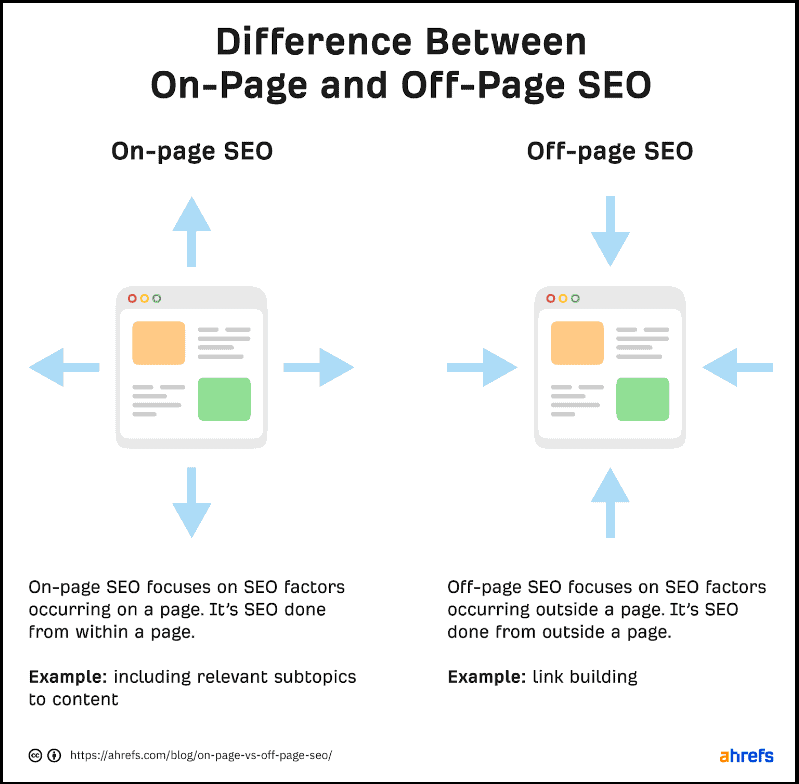
On-page SEO refers to what you can do within your website (including working on optimized keywords, image alt text, meta title, and URL) to improve search engine rankings.
Instead, for off-page SEO, think of strategies you can perform outside your website, such as getting links and improving branding and online reputation.
Create Backlinks to Improve Off-Page SEO
Do you know that pages with a greater number of backlinks tend to have a higher rank as compared to the ones with fewer backlinks (Backlinko)?
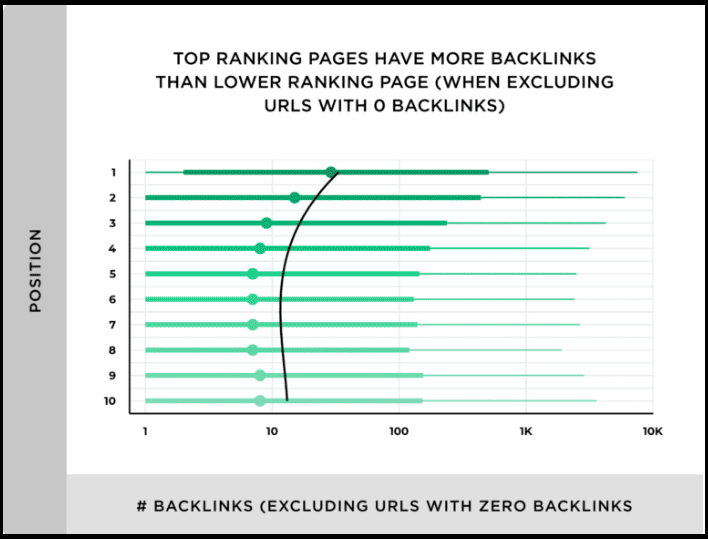
I know.
This SEO statistic probably does not surprise you.
In fact, backlinks are likely to be the most crucial part of a successful off-page SEO strategy.
The reason?
Google search results are based on the PageRank algorithm, which considers the quality and quantity of links pointing to a site.
Although Google has removed the PageRank toolbar, it still uses it to scan web pages.
👉 For this reason, there is a direct relationship between the amount of referring domains and the number of keyword rankings.

Now the question is, how can you acquire quality links?
There are two ways:
- Link Building (artificial backlinks)
- Link Earning (natural backlinks)
Artificial vs. Natural Backlinks
Before delving into each of these strategies, it is essential to understand the difference between artificial and natural backlinks:
- Artificial Backlinks: when you buy or exchange a backlink to your site to improve rankings.
- Natural (or Editorial) Backlinks: when someone spontaneously adds a link to your site or page because he considers it useful for his audience.
With this in mind, let’s see a few effective methods to build links:
Email Outreach
Email outreach is one of the most popular ways to create relationships and earn backlinks.
With this strategy, you contact people in your industry to inform them about your content.
But, how does it work?
If you’ve created something valuable (be it an in-depth guide, a product, a service, or a collection of stats), you can decide to seek out influential people in your niche and let them know about it.
There are several methods to search for contacts, like forums, directories, blog comments, or even Google.
Once you have a list of people, divide them into categories. First, the most important contacts, and then the most accessible ones.
Use different approaches to get in touch with influencers in your industry. If they are big ones, be sure to find a way to get introduced first before asking for something.
For the middle and micro-influencers, you can use a template to contact them and ask for feedback on your content (to get a share or a mention in the form of a backlink).
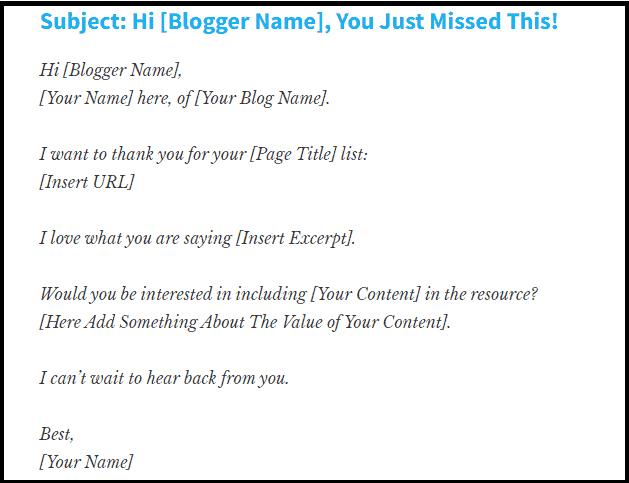
Community Sites
Forums, Q&A sites, and online communities like Reddit are all excellent places to share your knowledge and promote your content.
While most of these links are “nofollow,” you should know that a natural backlinks profile has a mixture of both “dofollow” and “nofollow” tags.
Other than that., blog comments are another great way to spread the word about your website and get links.
Still, commenting on most websites will give you only a “nofollow” link, but a meaningful comment will put you in front of a broad audience (especially if you are targeting a prominent site in your industry).
Now, do you want to know a secret?
Google used not to count no-follow links in the past.
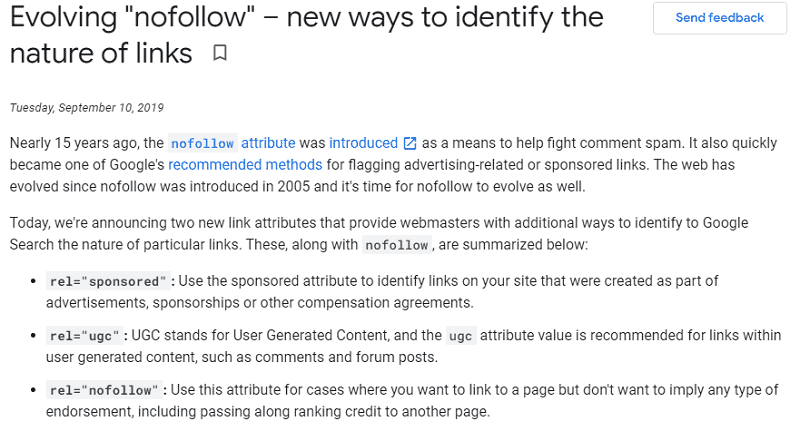
But since September 2019, they announced the introduction of new tags:
- rel = “sponsored”: applied on sponsored content (for paid articles)
- rel = “ugc”: UGC means user-generated content (find this tag on testimonials, comments, or forum posts, for example)
Pillar Articles
Pillar articles are your blog assets. They are usually long posts that include meaningful insights and analysis, along with the latest statistics and data (like this post).
There are no exact definitions for long-form and short-form content. However, most writers and digital marketers agree that long-form content usually contains 2000 words or more (including articles, white papers, ebooks, and tutorials or how-to guides).
So, what does it mean for you?
It means that if your content is well-researched and contains valuable data, statistics, or infographics, it may attract backlinks from other websites in your niche.
In addition to further increasing website traffic, this also strengthens your inbound link profile. Armed with the right data type, you can even attract backlinks from high-authority websites.
Let me explain how.
Backlinko analyzed 900+ million blog posts with BuzzSumo and discovered that long-form content gets 77% more links than shorter posts.
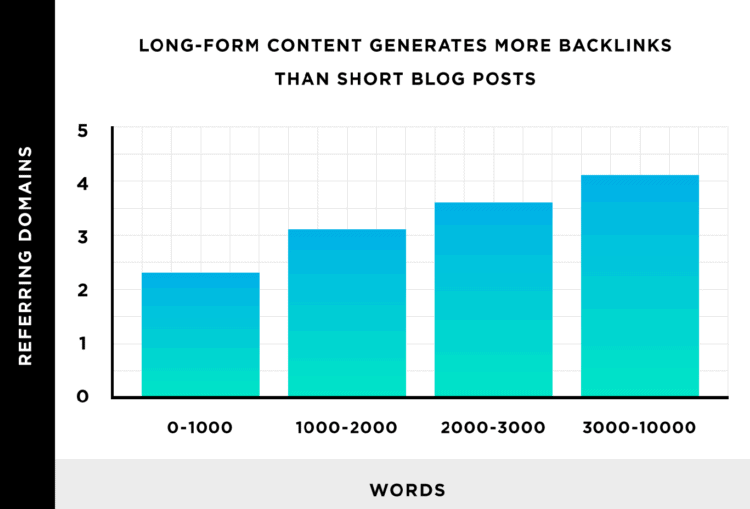
Think about it.
Keyword-rich content and a robust inbound link profile directly contribute to your website’s search engine rankings. It tells search engine bots that you are here to deliver value to your audience.
And if you post well-researched and engaging long-form content, your audience is likely to spend more time on your website. This improves website parameters such as bounce rate and time on site.
✅ In short, long-form content based on semantic SEO strategy positions you as a brand that cares about readers and wants to add value to their lives. This, in turn, helps you gain the trust of your audience and builds brand credibility.
Improve E.E.A.T.
Off-page optimization helps Google identify how users perceive a specific site and, most of all, the brand and business behind it.
It is because websites with high-quality content and valuable information are more likely to:
- be linked from other sites;
- obtain shares on social media (Facebook likes, Tweets, Pinterest shares, etc.);
- be placed in browser bookmarks;
- receive mentions among communities of like-minded users (e.g., forums and blogs);
- get your content placed in SERP features;
- be included in voice search results;
- be featured in Google Discover feeds.
Can you imagine that much love from search engines and users?
You can achieve that by improving your Experience, Expertise, Authoritativeness, and Trustworthiness (E-E-A-T acronym), which represents the three fundamental parameters used by Google quality raters to evaluate web content.
Also, by avoiding duplicate pages and focusing on building relevant and informative articles.
But, what is the secret behind it?
It means satisfying search intent with in-depth content that makes users stay more on your site, which helps improve dwell time, bounce rate, and click-through rate.
👉 In a few words, focus on delivering the best user experience possible (paying attention to the core web vitals of your pages and website architecture, including checking any HTTP status codes).
With this in mind, here are two practical ways to improve E.E.A.T.:
- Establish Yourself As A Thought Leader In Your Niche
- Provide Quotes and Interviews
Establish Yourself As A Thought Leader In Your Niche
You’ll grow a more robust audience and create more quality connections if you first establish your experience in your brand niche.
And the more expertise you are given, the more value will be attached to the content you produce. Ultimately, this will result in more people sharing and linking to it.
So, how can you do that?
Make sure your content is relevant and authoritative.
💡 Participate in AMAs (Ask Me Anything) on Reddit and Q&A on Twitter to boost your reputation and gain a more loyal following.
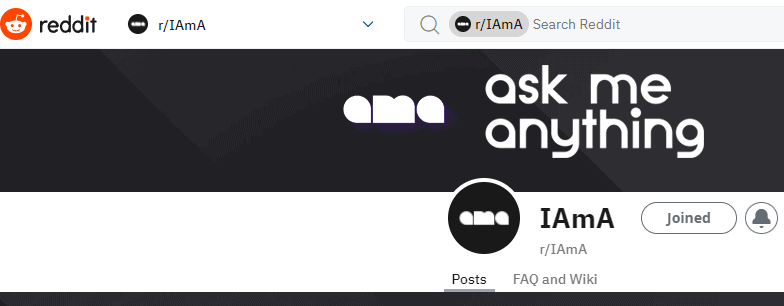
Provide Quotes and Interviews
Do you want to make your name known?
One way to do this is to encourage people to ask you for quotes and interviews.
Not only it will give you a way to establish experience, increase name recognition, and expose yourself to a new audience (or them to you), but your interviewer will most likely include a link to your site.
✅ It also works in reverse.
For example, if you were making a collection of expert tips and needed quotes from experts in your industry, you would offer them the opportunity to participate in exchange for a link to their content.
Off-Page SEO Techniques
Creating links is the best-known off-page SEO strategy for improving search engine rankings.
Still, many other factors, such as online reputation signals, branded searches, and social signals, can be used.
Brand Mentions
Whether you are getting linked or unlinked brand mentions, it can help your website SEO.
If someone mentions your business with a link, it helps improve branding and online visibility.
But how can an unlinked mention be worthwhile?
One of Google’s patents shows that even unlinked mentions are taken into account by their algorithm to calculate the positioning of pages in search results.
If you think about it, it is a logical concept.
A user is writing an article and mentioning your brand but not linking to it, which means he still considers it important. The only difference is that this mention will not bring referral traffic.
So work on your authority online to get more mentions, in general.
👉 If you wish, you can follow this strategy to research unlinked mentions and ask to get them linked to your website.
Social Signals
Social signals are all those engagement actions (shares, likes, comments) that your content gets on social media networks like Twitter, Facebook, Pinterest, and Instagram.
Today, we know that social signals have a relationship with rankings, but they do not directly affect them.
So, how can they help your Google SEO?
Social media can help you indirectly because the more your content is shared, the wider the audience can reach, increasing the chances of being read, saved, and eventually linked.

With that in mind, social media marketing can also be a powerful marketing weapon.
Here are some practical ways to increase social shares:
- Place buttons on your website to help users share your content. If you are not into coding, there are a ton of social sharing plugins available for WordPress. I use the SocialWarfare plugin. It’s light and does not impact the site’s loading speed. The well-designed buttons are completely customizable and can display share counts, including tweets.
- Write irresistible headlines. You have more chances to get your content shared, with beautifully crafted headlines. Consider using lists, numbers, and cliffhangers.
- Write great content. It may look like classic advice, but great content gets shared, while bad content does not. So, invest in producing the best content you can create.
- Use attractive media. Consider using SEO-friendly images, interesting infographics, and quote-picture overlays that are easy and fun to share.
- Properly format your content. Use short paragraphs, bullet points, subheadings, and bold text. All these practices help readers better digest your content.
- Refresh content. When you see content decay, it is probably time to update your old content.
Online Reputation Signals
Testimonials and reviews are one of the most important off-page factors for local SEO and for positioning in the Google Snack Pack results (also known as “Local 3 Pack”):
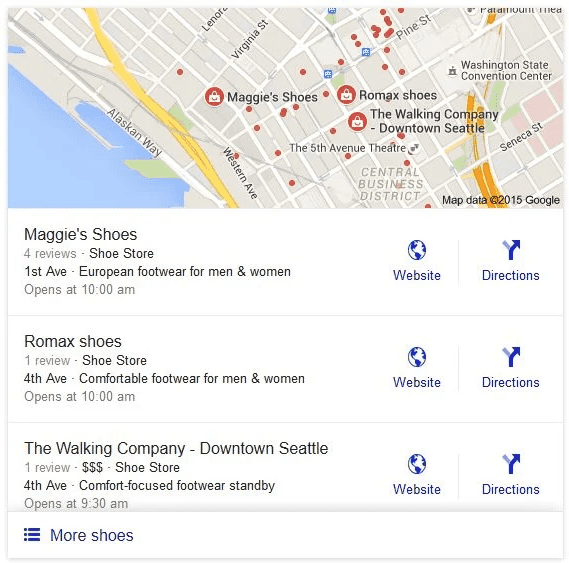
💡 In general, the more positive and authentic reviews you get on Google My Business and trusted third-party sites (such as Trustpilot or G2), the more likely you can reach the ‘snack pack’ position.
Note: On the other hand, negative reviews have the opposite effect.
Now, do you want to know more about it?
Google My Business is a free service for listing your business. It’s basically how you want your company to appear on Google Search and Maps.
If you want to rank for keywords with local intent, claiming and optimizing your Google My Business profile is one of the most critical off-page SEO factors.
My Experience with Off-Page SEO
I’ve been focusing on improving my brand on the internet since when I started erikemanuelli.com
I worked on all the tips mentioned above, including:
- Guest Blogging
- Brand Mentions
- Community Sites
- Pillar Articles
- Social Shares
Guest Blogging
I was able to get published in more than 50 publications during 2022 (reaching 80 guest posts in 2023).
Some of my best ones include Serpstat, or Mention, for example.
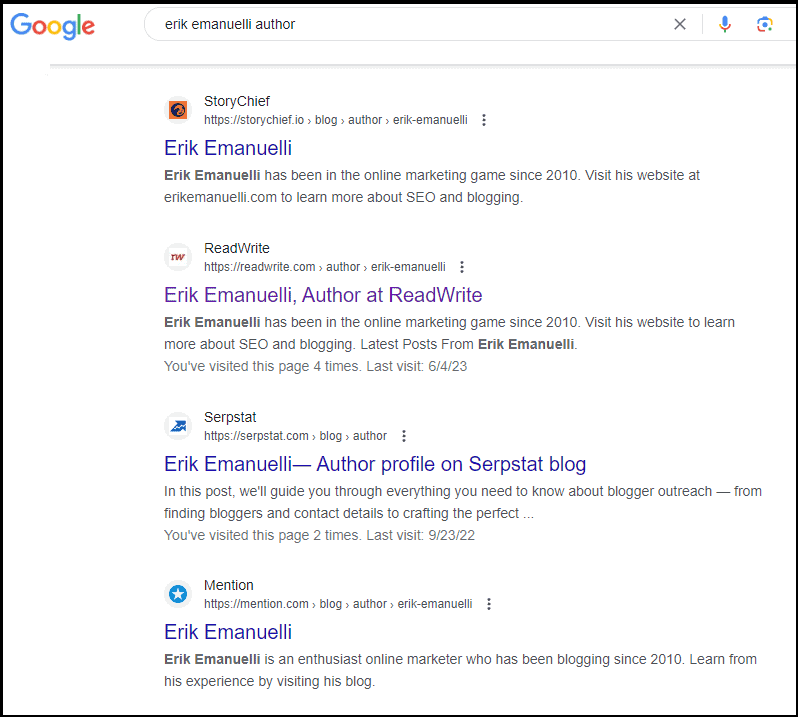
But wait, it does not end here.
I’m a ReadWrite author and one of my articles there has been syndicated by MSN:
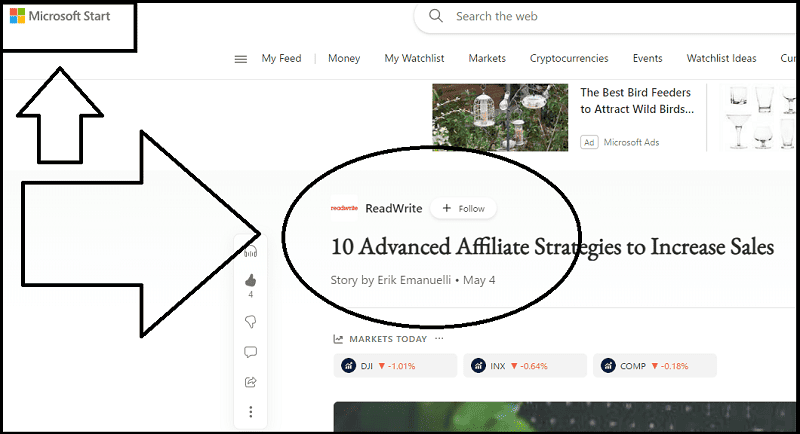
✅ In short, for me, guest posting means building connections, reaching a new audience, and building my online reputation.
Brand Mentions
Sometimes, I get invited to participate in expert roundups and I have the opportunity to share my two cents about topics related to my niche.
For example, I’ve been featured in giant publications like Godaddy:
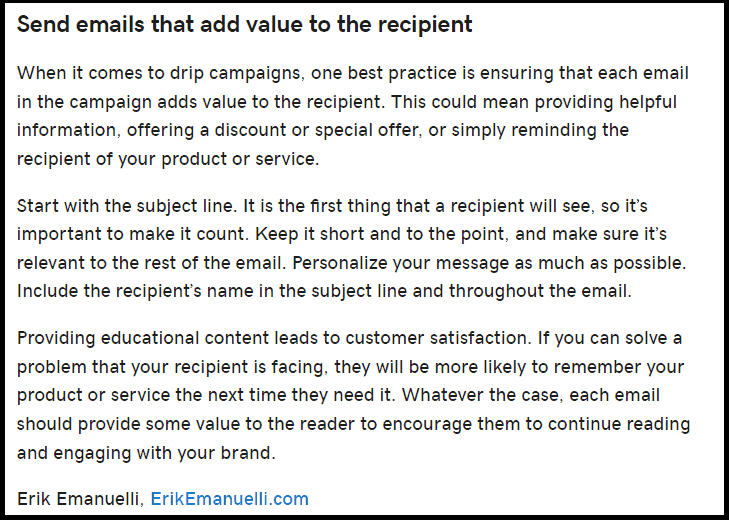
I think this kind of brand mention helps in building your overall E-E-A-T.
Simply put, being a recognized expert in your niche can help you land more opportunities like this.
Also, getting mentioned in well-known websites or blogs can help your website link profile diversity and authority.
Do you want to know how it works?
Try searching on Google for roundups using the operator:
intitle:expert roundup + your keywords
Then, you can pitch the site owner your thoughts about that topic for a chance to get included in the article.
Community Sites
Quora has been giving me good results, too.
In fact, I’ve received more than 160.000 views on my answers!

In this case, the secret lies in choosing the right questions and spending time properly formatting them.
Do you want to know the secret behind it?
👉 Choose a niche and stick with it. Quora has a very powerful algorithm so it will offer you related topics as you answer more questions.
I highly recommend answering the featured and trending questions first.
Pillar Articles
I always aim to write comprehensive content that covers all the keywords of a certain topic.
For instance, one of my pillar articles (about featured snippets), has been picked up by an author on MOZ and included naturally in a post!
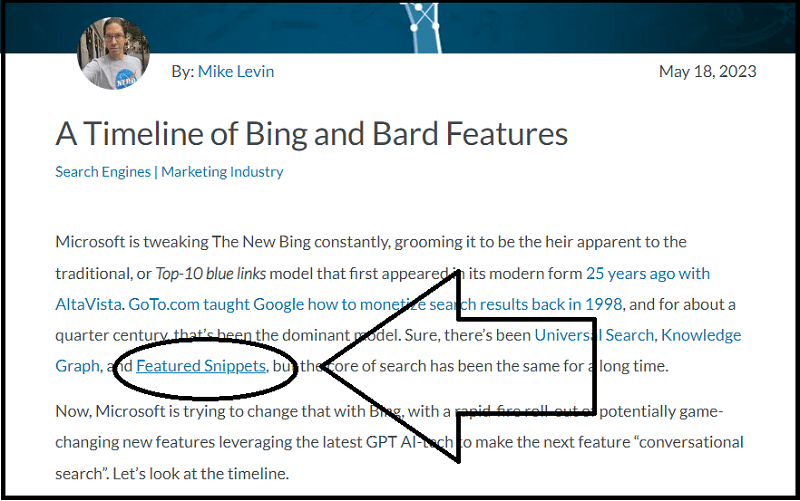
Social Shares
Other than Quora, I use other social media sites to get more engagement with my content.
I focus a lot on Twitter, which gives me good exposure.
I also try to join online conversations related to SEO.
The result?
Some of my best pillar articles received over 3,000 social shares, so far.
Like my on-page SEO guide:
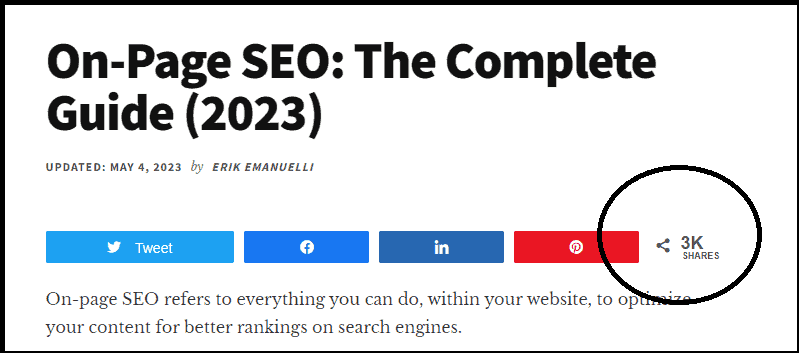
💡 In the end, off-page SEO is all about building relationships, being helpful, and sharing great content.
It takes time but it’s a rewarding process that can be very beneficial for your brand and business in the long run.
And one of the prizes could be a knowledge panel like mine here:
Off-Page SEO FAQs
Q: What are the main techniques of off-page SEO?
A: The main techniques of off-page SEO are link building, content marketing, and social media marketing. You can also do guest posting, podcasts, and video marketing.
Q: What is the most important part of off-page SEO?
A: Link building is the most important part of off-page SEO. Quality backlinks improve your website’s authority and help it rank higher in search engine results pages.
Q: What is the main purpose of off-page SEO?
A: The main purpose of off-page SEO is to increase brand awareness, website traffic, and search engine visibility. It also helps build relationships with influencers and industry leaders who can help direct more visitors and customers to your site.
Q: How often should I do off-page SEO?
A: Off-page SEO should be an ongoing process. You should strive to build relationships and create content regularly as part of your overall online strategy. Additionally, you should keep track of new trends in the industry and use those to your advantage.
Q: What are two types of SEO?
A: The two types of SEO are the following ones. On-page SEO focuses on optimizing individual web pages, while off-page SEO focuses on strategies to build relationships and increase website visibility online. Both are essential for achieving the best possible search engine rankings.
Q: Is off-page SEO still there?
A: Yes, off-page SEO is still relevant and important for improving search engine rankings. While it isn’t as important as on-page SEO, it can help build relationships with influencers and industry leaders who can help direct more visitors and customers to your site.
Q: How is an off-page SEO calculated?
A: Off-page SEO is generally calculated through the analysis of links pointing to a website, including their quality and quantity. This can be done manually or by using tools such as Moz’s Link Explorer or Ahrefs Backlink Checker. Additionally, factors like online reviews and citations also play an important role in off-page SEO.

Before You Go
Thanks for reading this far!
Now that you have learned a lot about off-page SEO and why it’s crucial to work on it to boost your site rankings on search engines, why don’t you take some time to learn more about on-page SEO?
This 5000 words guide covers everything you need to know about it:
Now, it’s over to you.
Have you found this guide helpful?
Would you like to recommend particular strategies?
Did you spot an error in this post?
Please, share your views in the comments below. Thanks!

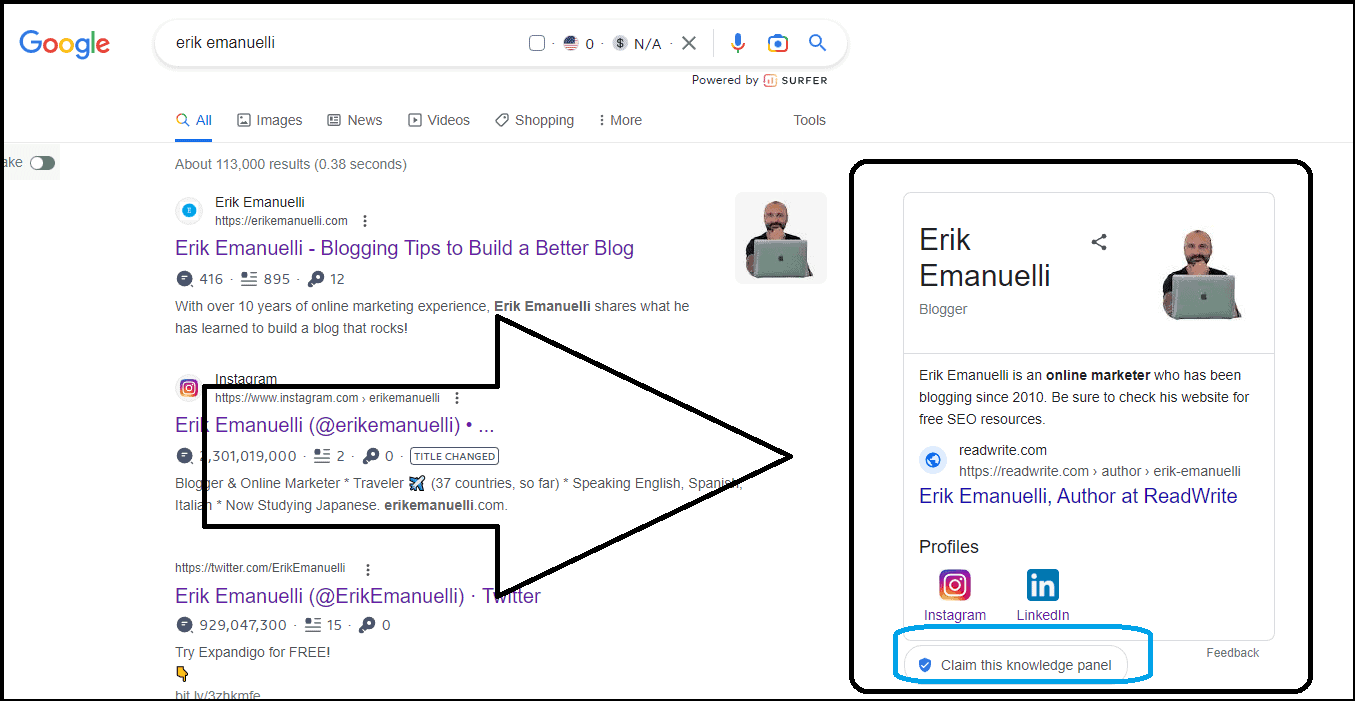
Hi Erik, thanks for the tips on Reddit. I’ll be joining that group. Reminds me of Quora with the questions and answers. Great tips on how to generate more links off-site. Thank you.
I’ve been a Reddit fan since 2011, Lisa!
Glad to read you liked the tips in this post.
Thanks for stopping by and commenting.
Hi Erik, I also read somewhere that EAT means having your phone number in your footer, do you agree with that one? Thanks.
I think in general you should have visible your contact details.
But I don’t see any phone number in the website of prominent SEO figures such as Backlinko, for example.
Thanks Erik. Appreciate the answer. I didn’t want to have my phone going off with spam or sales pitches 🙂
This was a really great read Erik! Always love to learn new things about SEO. One thing that I am really curious about is about establishing E.A.T – I wonder what kind of algorithm Google uses to determine that “this person is legit, let’s push him up” and “this one is not an expert, let’s try the other site”. I think backlinks definitely play a big role in that – but still.. I’d love to one day find out about all the secrets of that algorithm haha 🙂 Anyways, keep up with the great content Erik 🙂
Hey Tom,
good to hear you liked my off-page SEO guide! 🙂
We’re in the same boat. I really would like to discover the secrets of Google algorithm too, some days.
I’ve visited your site, I loved the video that starts when you land on it.
One question, tough. Why is it working on desktop, but not on mobile?
Thanks! My website is currently under reconstruction – so even an actual video is just a placeholder. However, I will have there an animated showcase of my presentation design work 🙂
Also thanks for the heads up! I didn’t know it is not playing on the mobile!
Good to hear it, Tom. 🙂
I look forward to seeing your site live!
Hello Erik,
Great and very informative post. SEO is a very dynamic world. Since Google always and frequent changes its algorithm so, we need to adapt strategies according to it. Off-Page SEO plays a crucial role in ranking a site in search engines. This post will definitely help newbies.
Regards,
Vishwajeet Kumar
Hi Vishwajeet,
you’re right about Google algorithm changes.
Luckily, there are some constant factors that we can follow over time.
Thanks for your positive comment. 🙂
This is a very well written article Erik – thanks so much. I’m right into backlinks at the moment – all good if I share this article in my recent backlink article on my blog?
Hey Corey,
thanks for the positive feedback.
Really appreciated, seen the efforts made to create this kind of guides.
And that would be great! I’d love to read your backlink article. 🙂
Great post. very informative and detailed. Thanks for sharing.
You’re welcome, Winfred.
Hi Erik,
Great tips about SEO. I particularly like the idea of your template for email outreach to ask for feedback on our content. Thanks for sharing it.
Thanks for the feedback, Julie.
Hope it helps. 🙂
Hi Erik, Awesome tips about SEO, Yet what are your thoughts about Google’s latest core update, which eventually hit some years old real blogs/websites which never used AI and have Good content and links profiles?
Hi Jitender,
I think it depends on each case. Some websites may have deserved the hit, some others less. Google is constantly testing and improving its algorithm and what I learned is that content creators should focus on creating content that satisfies search intent. In the end, it’s all about the user experience.
As per your question, was the site hit by the SPAM update?
Site owners should self-assess their content by answering these questions:
https://developers.google.com/search/docs/fundamentals/creating-helpful-content
Was the site hit by the core update?
Probably your competitors outranked you by creating better content.
If that’s you, then in order to be considered for top rankings, you likely need to show Google more original, uniquely valuable content.
Usually this comes from experience (share case studies, examples, real life customer stories). That’s the type of thing Google likes to reward.
Not sure about guest posts. Have freelancing for a top tier online marketing agency and they pay for sponsored posts masked as guest posts !?
Staying on easier ways to get backlinks: commenting, social media, forums and answer sites.
I think Google has become better at recognizing legitimate guest posts.
After all, an SEO beginner could easily spot a website publishing content with paid links (e.g. PBN sites).